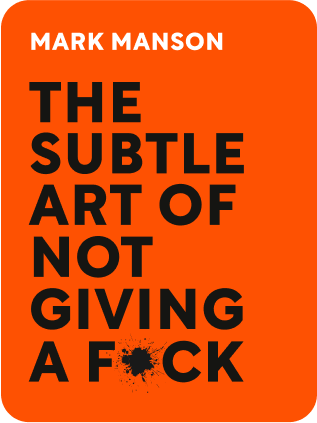

This article is an excerpt from the Shortform book guide to "The Subtle Art of Not Giving a F*ck" by Mark Manson. Shortform has the world's best summaries and analyses of books you should be reading.
Like this article? Sign up for a free trial here .
What are your values in life? Are there any values you’d like to change? Why is it important to define and live by one’s personal values?
In his book The Subtle Art of Not Giving a F*ck, Mark Manson talks about finding your values. Your personal values are the basis for everything you do. That’s why it’s important to discover what you value, what values may be harming you, and how to fix your negative values.
Continue below for everything you need to know about finding, understanding, and changing your personal values.
Identify the Personal Values Underlying Your Emotions
If you are finding your values, ask yourself: How do I define success and failure? What yardstick am I measuring myself against?
- Our values are the basis for what we do. The kinds of problems we have are a result of our values, and they affect how happy and satisfied we are.
- Since our emotions and thoughts are based on our values, a nonconstructive value can throw them off balance.
| In Maybe You Should Talk to Someone, Lori Gottlieb—who’s both the author and the main character—illustrates the importance of not only consciously uncovering and naming your core values, but also replacing nonconstructive values with constructive values. Gottlieb isn’t able to move past her midlife crisis until she identifies the values that caused it. Through her work with another therapist, she eventually realizes that she values security and control; she feels like she’s succeeding when things are going according to plan, and she spirals into a crisis when her plans for her own life are suddenly uprooted (in this case, by an unexpected breakup). In order to heal, she has to embrace more constructive values like accepting things as they are, enjoying the thrill of uncertainty, and appreciating each moment as she lives it.) |
Ask Difficult Questions
To understand our feelings and values, Manson suggests that we ask ourselves difficult questions—questions that can make us uncomfortable. For instance:
- Think of something that bothers you.
- Ask yourself why it bothers you.
- Often, when something bothers us, it’s because we subconsciously think that we’ve failed in some way (that we’re wrong about something, for instance).
- If you do believe that you’ve somehow failed, ask yourself why you think so.
- Ask yourself whether there’s another way you could look at the situation.
- For example, what if it’s not a failure, but rather a learning opportunity?
| Using Questions to Find Your Purpose Another way to understand your core values is to understand what you hope to achieve in life—in other words, your purpose. Psychologist Angela Duckworth suggests figuring out your purpose by writing down every goal that you have (from short-term goals like returning a phone call, to long-term goals like losing weight or earning a college degree). Once you have your list, organize your goals into a pyramid. The base of your pyramid will be your short-term, concrete goals like making that phone call. Above that will be slightly longer-term goals, like passing a test or handling a project at work. Above that will be even longer-term goals, like earning a degree. The trick is: Each level of the pyramid should support the level above it. If the goals in one level don’t get you closer to the goals in the next, then you should discard them. At the very tip of the pyramid will be your ultimate purpose in life—your “top-level goal,” as Duckworth calls it. You may not even know what your top-level goal is at the moment; to find it, start with a lower-level-goal and ask yourself “why?” For example, why do you want to go to that college? When you have that answer, again ask yourself “why,” and continue for each of your answers. For example, why do you want to major in engineering? Why do you want to get a job building safer structures? Why do you want to make the world a safer place to live and work? When you get to the answer of “Just because,” that’s your highest-level goal. Alternatively, you could ask yourself questions like, “Who am I really?” “What kind of world do I want to create?” In other words, as Manson would put it, “What do I give a f*ck about?” This is an effective method to learn your own values because, ultimately, your top-level goal must be based on those values; if it weren’t, then you wouldn’t be so passionate about it. |
Positive Values vs. Negative Values
Manson says that when you have poor values and standards, you give f*cks about things that don’t matter. That leads to difficult or even unsolvable problems. Negative values are non-factual, non-constructive, or out of your control. For example:
- Popularity—out of your control; it’s based on others’ opinions of you.
- Power over others—non-constructive; it requires hurting or manipulating other people in order to get what you want.
- Feeling good—non-factual; it’s a pure emotional response.
(Shortform note: Negative values like these usually stem from what you think other people value. They’re about how you relate to others (power and control), what you think they admire in you (money or status), or how they think of you (popularity, admiration, fame, and so on). Manson urges you to instead choose values that are about yourself, because you can’t control what other people think or do. Since it’s out of your control, it’s not worth giving a f*ck about.)
By contrast, Manson believes that when you adopt healthy values and standards, you reserve your f*cks for things that lead to good problems and enhance your well-being. Positive values are based on fact, are constructive, and have an outcome you can control.
| The philosopher Friedrich Nietzsche discussed how people create their own values by arguing that things in themselves have no value—they simply exist, and any significance that we attach to them is our own creation. Therefore, we’re free to make any judgments that we want about what’s important or not important. In Nietszche’s philosophy, we can see the roots of Manson’s argument that we must choose what to value. However, Manson expands on Nietzsche’s ideas by saying that we must choose the right things to value; otherwise, we’re setting ourselves up for frustration and unhappiness. |
Five Alternative Positive Values
The rest of Manson’s book discusses five beneficial values that run counter to cultural and social media messages that Manson advises you adopt. They require addressing problems rather than avoiding them through denial or feel-good exercises.
- Taking responsibility for everything that happens in your life, whether or not it’s your fault.
- Accepting uncertainty: Accepting that you might be wrong, and that you don’t know everything. Examining and doubting your beliefs.
- Embracing failure: Being willing to uncover your flaws and fix them, as well as learn from what goes wrong.
- Practicing rejection: Focusing on a few important things, and rejecting unimportant things. Also developing the ability to say “no,” and accept “no” from others.
- Reflecting on your mortality to keep your life and values in perspective.
Each of the remaining chapters explores one of these topics.
| Manson’s Values Compared to Aurelius’s Meditations Manson’s five counterintuitive values are very similar to some of the main topics of Marcus Aurelius’s Meditations: The Subtle Art of Not Giving a F*ck: Take responsibility for everything in your life. However, remember that responsibility and blame are not the same thing. Accept uncertainty. Remember that you don’t know everything; doubt yourself and your beliefs, and examine them critically. Embrace failure. Learn from your mistakes and use your failures as opportunities to grow. Practice rejection. Stop giving f*cks about the unimportant things in your life. Reject everything unimportant.Corollary: Practice saying no to people, and accepting it when people say no to you. Reflect on your mortality. Keep your life in perspective, as that will help you develop constructive values and standards. Meditations: Be strict with yourself and patient with others. The only things you can control are your own actions—thus, you are personally responsible for everything that you do. You are not responsible for what other people think, say, and do; that’s neither your responsibility nor your problem.Embrace logos (meaning both personal logic and natural laws). Aurelius believed that the universe was governed by perfect logic and natural laws, which ensured that everything would proceed in the best possible way. However, people have limited perspectives and imperfect logic, which often leads them to incorrect conclusions. Aurelius argued that, if you feel unhappy or anxious, it’s because you’re struggling under some incorrect understanding of the world. Live without fear. Aurelius insists that the only danger in life is that which damages your character—in other words, the only things you should fear are your own flaws. Thus, you should work ruthlessly and fearlessly to improve yourself.Only concern yourself with living well. Aurelius urges you to reject material wealth and pleasure, and devote yourself completely to your duty (whatever that may be). Examine life and death rationally. A person’s life is finite, and insignificant compared to the world. Therefore, anything you do for yourself is meaningless; every action you take should make the world better somehow. |
Difficulties With Changing Your Values
Manson points out that you’re already making choices of what to give a f*ck about. Change is just a matter of choosing to give a f*ck about something different.
While it sounds simple, there are uncomfortable (but temporary) side effects:
- Feeling uncertain: Changing long-held values is disorienting. You’ll question whether you’re doing the right thing.
- Feeling like a failure: When you try to apply new values and standards, the old ones will keep coming to mind in each situation. You’ll feel like a failure for discarding them.
- Facing objections: Your relationships are built on your values, so when you change your values, your relationships will change as well. You’ll get pushback.
According to Manson, feeling uncertain is the most prevalent reaction when you decide to stop giving a f*ck about certain things, and to care about other things instead. Just remember that cultivating uncertainty is the second of the five alternative values that can change your life.
| Identifying Your Values Is the First Step It’s important to understand how to change your values, and what struggles you might face in trying to do so. However, you may find that you’re not even sure what your values are. For example, do you really give a f*ck about people liking you? Perhaps it’s actually confidence that you value, and popularity is just a good confidence-booster. Business coach Scott Jeffrey suggests a seven-step process to discover your true, core values: Keep an open mind You probably think that you already know who you are and what you value. That kind of false certainty will interfere with this exercise; try to start with the assumption that you don’t know yourself. List your values Listing the values that you know you have will help you to discover the true values underlying them. Group the values by themeFind the central themesOnce you’ve grouped your values by theme, pick one value in each group that best exemplifies it. Highlight that value, and leave the others as explanation or context for it.Whittle down your listEven after step 4, you might find that you’ve got too many values to effectively work with. Try to narrow it down to the 5-10 that are most important to you.Contextualize your valuesFor the 5-10 core values you’ve chosen, expand each into an actionable statement. For example: “Honesty—Always tell the truth, even if it might make me look bad.”Test each valueCome back to your list the next day and look it over with fresh eyes. See how each value makes you feel, and whether they’re consistent with who you are or who you want to be. |
Measuring Yourself
Manson defines values as what you believe to be important and what you want to achieve. He defines standards as the yardstick you use to measure success or failure in living up to your values.
What are your personal standards? We have internal standards against which we measure ourselves, without necessarily being conscious of them. It’s important to recognize and understand them so we can change our values if they’re not constructive.
Our values and standards can be constructive or destructive—they may lead to good problems that we enjoy solving, or to problems that stymie and frustrate us, leading to unhappiness.
| Tony Robbins’s Awaken the Giant Within recommends setting a mixture of standards for yourself: some very high standards that force you to grow and some reachable standards that let you enjoy your accomplishments. Setting only unrealistic standards is setting yourself up to fail, while only setting low, reachable standards will lead to stagnation. For example, say that someone who’s not physically fit wants to get in better shape. A reachable standard might be to exercise three times a week; an unrealistic standard would be to become an Olympic athlete. The reachable standard will let this person feel like he’s succeeding—which, in fact, he is, since he’s exercising and getting into better shape. The less realistic standard of competing in the Olympics will force him to push himself harder than he normally would, since he’s trying to get himself to the same level as the world’s best athletes |

———End of Preview———
Like what you just read? Read the rest of the world's best book summary and analysis of Mark Manson's "The Subtle Art of Not Giving a F*ck" at Shortform .
Here's what you'll find in our full The Subtle Art of Not Giving a F*ck summary :
- How to clarify what's important to you (and not just what you think should be important)
- Why it's okay for things to not always go well in life
- Why you need to care about fewer things






